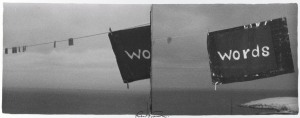Up Against the Word(s)
– a philosophy of language series –
in the sociology of knowledge
[if this book were a book and shaped like a rectangle, it would be redundant among other things and so on, but perhaps it is a circle and therefore repetition is therefore]
(one of many disclaimers)
Part the Second: True to your word(s)
And so one must wonder over/about how to shape or forge a writing that might be “true.” True to what? is the question that first comes to my mind. Immediately I sense an answer along the lines of “true to experience, human experience, living.”
Okay. But the options are many, perhaps limitless, no? It is easy to imagine someone setting out using language in hopes to be true to a theory, or a memory, an historical event, a relationship or a dream, a feeling or a painting one has seen. Some may intend to be true to the present (as it’s occurring) or to the past as it’s been recounted or remade in language or impression? To be true to ideas or previously languaged things (obviously involving so very many removes and hypotheses about what the previous tellers were attempting to be “true” to, or not). Or how about language itself, theis malleable system of signs, communication – how it works, what it references, invents, incites, depending on the terms selected, their organization, pronunciation, punctuation, etymologies, contexts and ideologies?
All would apparently boil down to the experience of the one implementing the signs: how that one has acquired the forms, contents, vocabularies, grammars and syntaxes of the utilized signs, or, beyond that, their singular perception and interpretation of their own memories, relations, readings, hearsay, acquisition of data and so forth. All to say “truth,” if one means by that some objective correlative to actuality, to “things as they are,” seems highly suspect, even as in this case, I might attempt to be “true” to the highly suspect meaning of the word and signified concept (ideology) “truth.”
So, if correlation to actuality becomes a highly individualized affair of each language-user, that a human, in fact, cannot hope to use words in any fashion directly translatable or apprehensible to another…why the setting out to inscribe?
One might suggest it’s a relative thing – like space and time – that communication takes place in fields of overlap between the flexible meanings of signs. That one hopes for difference and therefore the requisite similarities, to provide and provoke comprehensions limiting and expanding but somewhat assimilable – conversational – texting-with, vocalizing-with, another or others…some active reduction and proliferation of possibilities between multiple language-users and their contexts of situations.
Fair enough. A hope for convergences in a commonly based palette and culturation. Generalized and individualized from all sides.
Is this what the “writer” is after? Some correspondence (between themselves and their experience, between that relational complex and others)? Perhaps. Or maybe more accurately the languaging impulse fluctuates along a vast scale of minute gradations of aims and intentions, including, always, the relational effects of using (participating, knowing) language itself. It’s a mud pie! And so beautiful it looks like chocolate mousse sometimes.
And just became so, in the metaphoring of a kind of pie some persons will recognize, depending on their own experience and the culture they come from.
In part.


